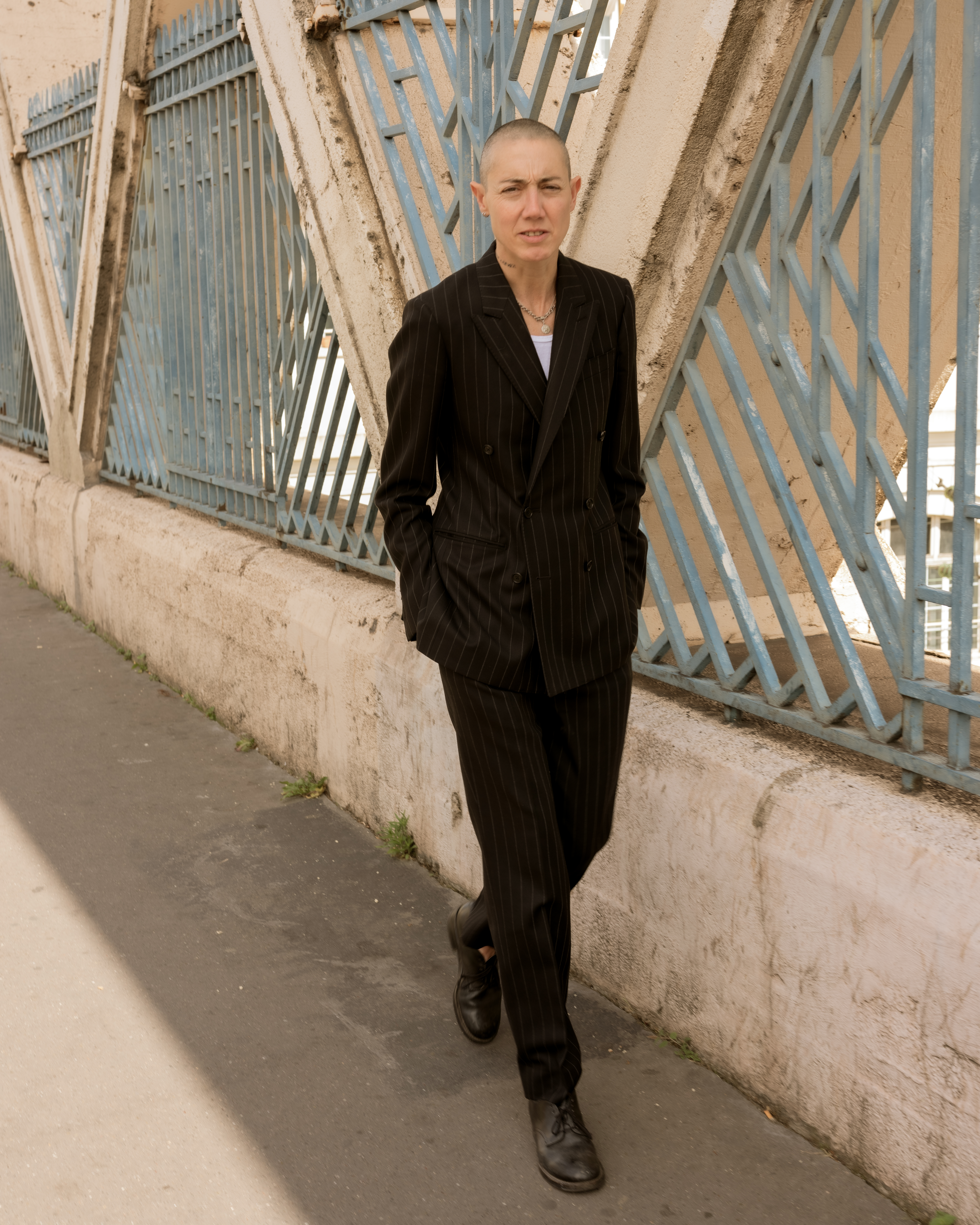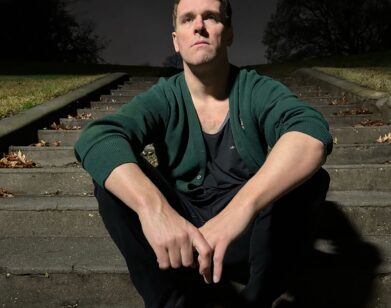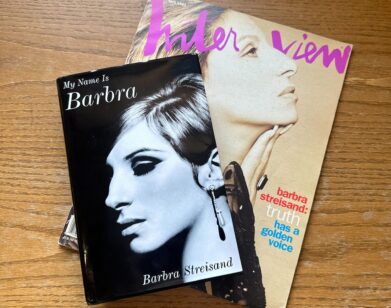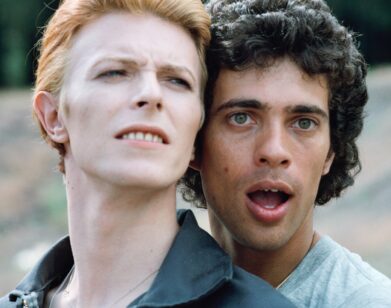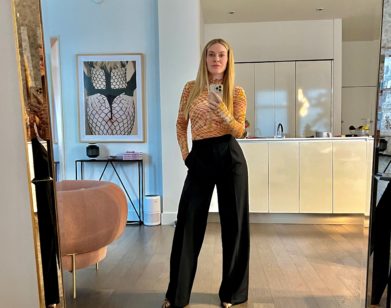LIT
Constance Debré Started Sleeping With Women. Then She Wrote Four Books.
Constance Debré woke up one morning in her early forties to a new world of potential. As the French author tells it, it was after she slept with a woman for the first time that she felt capable of writing. In Playboy, her first autobiographical novel, out today in an English translation by Holly James, Debré describes this multifaceted awakening literally. “She’s the first thing I see when I wake up….Her back, her shoulders, her ass. I see all her beauty, the beauty of women, I see my own body, new. I tell myself there are lots of things that are possible.”
Debré recounts becoming gay in direct, simple, and often amusing terms. After divorcing her husband, the narrator leaves her job as an esteemed lawyer defending “pedophiles, thieves, rapists, armed robbers, murderers” and abandons her upper-class life. She alters her appearance (tats, increasingly short hair), her routine (she starts swimming every morning), throws out all her belongings (books included), and devotes herself to writing. Playboy follows her first two affairs with women: one older—perhaps straight, and married with children—the other young, queer, and unemployed. The first affair blossoms slowly. “I don’t know when I realized it would be up to me,” Debré writes. “The thought scared me. I liked it, too. I liked the idea of being the boy.” In the course of her transformation, Debré undercuts her startling nonchalance with confessional revelation: “She and I are only fucking. But I’m wondering if maybe I never knew love before.”
All this candor had a price. Although her second autobiographical book, Love Me Tender, was published in English last year, Playboy—the events it recounts and the book itself—is both Love Me Tender’s precedent and cause. The second novel recounts how Debré’s newfound “lifestyle,” as the euphemism goes, subsumed her in a yearslong custody battle for her son, who she was only permitted to see during supervised visits. “There’s no point in writing if there’s no danger,” she told me on a Zoom last week. In France, the name Debré bears a particular weight (her grandfather Michel Debré, a former prime minister, is considered the father of the country’s current Constitution, to name only one of her famous relatives). Before the publication of Playboy, I spoke with the self-described “cross between the Baron de Charlus and Sid Vicious” about the beauty and violence of loving women, what’s pleasurable about risk, and the power of simplicity, in both life and language.
———
JASMINE VOJDANI: Hello!
CONSTANCE DEBRÉ: Hello. You speak French.
VOJDANI: I speak French. We can do this in French, if you’d like.
DEBRÉ: Great, a huge luxury!
VOJDANI: Where are you right now?
DEBRÉ: Good question. I am staying with some friends in Paris because I still haven’t fixed my housing problem. I’m going to the United States for about two months and then I’m coming back, and I hope I’ll be able to fix it because it’s difficult. I’m not giving up all nomadism, which is to say that ideally I’d have a base in Paris, a little studio, because I do still have a son in Paris. Otherwise, lots of traveling, especially in the United States. I’m there quite often, especially in Los Angeles.
VOJDANI: What’s your relationship to the U.S.?
DEBRÉ: I’ve always loved it. I’ve always loved everything western from the end of the 20th century seeped in American culture. I’ve spent a lot of time there, under many different pretenses, since I was 18. I lived there for a year. My son is part American because his father is half-American. I’ve always managed to spend them there, especially in New York, which I know pretty well. But Los Angeles is my more recent discovery. I was talking about it with Virginie Despentes. We were saying that it’s really nice to not be around the language in which you work. I love being in an English-speaking environment, in the opacity of a language that isn’t totally foreign. I speak it, I understand it, but there’s still something that creates a distance that I like. In American English, there’s a simplicity, something direct. That’s one of my inspirations for my style, especially in Playboy. Trying to be clear and direct.
VOJDANI: I remember feeling that it wasn’t until I lived in France that I really discovered English through reading and was able to genuinely hear it. I wanted to ask about your last name, which is well-known in France. Does the experience of publishing translations in other countries, especially in the States, free you up in some way? Is it a relief?
DEBRÉ: It reinforces my work. I wouldn’t be writing if I wasn’t convinced that what I was writing was literature, or serious in some way. In France, I always felt that my work was partially distorted by the representations people had of me through my name. Totally delusional and quite uninteresting ones. Because my books happen to be read and appreciated in the U.S., England, Norway, Sweden, Germany, et cetera, that bolsters the idea that what I’m making is of interest, independent of all that stuff. There’s something very middle-class in French literature that deeply annoys me and that I actually find pretty weak.
VOJDANI: Can you say more about that? I got the sense that you found your style—simple, direct, sometimes brutal—by reading non-French writers.
DEBRÉ: I think that my experience as a criminal lawyer was very important because in the language of law, there’s something extremely precise and clear that I love. You have to convince the jury of very important things, so you have to be really efficient. To move them, you have to use a physical, precise, direct, and efficient language. I was really inspired by that. There’s 17th-century French moralists who also use language precisely like that. And of course, American literature. I love Bret Easton Ellis, but also American noirs. I’m thinking of Jim Thompson—very grim but very profound, without psychology. Otherwise, there are writers that have another style but whose universes I love, going from [Fyodor] Dostoyevsky to Thomas Berhard. It’s endless.
VOJDANI: You spoke about having to be convincing in your capacity as a lawyer. If you had to convince your readers of something in your books, what would that be?
DEBRÉ: I don’t believe literature is there to convince people. If I wanted to do that, I would have remained a lawyer or gone into politics. That’s not my inclination at all. I make literature, which means that I propose forms. All the novels I’ve written are in the first person, and it’s really the form that does something to readers. I don’t want readers to get bored. I try to speak to them about the questions that concern us, that are about the human condition within the banality of our contemporary existence, no matter what the events are. The events aren’t important in themselves, they’re pretexts, excuses. When I talk about coming out in Playboy, I’m not saying, “It’s awesome, it’s better to be gay than straight.” I just take a character to whom things are going to happen, like Odyssesus and his trials. How will this character make it through? What will this character’s relationship to the world be as they go through these ordeals? And all of that starts from the big questions: anxiety, fear, boredom, death, loss. That’s all there is. But you can’t bore the reader.
VOJDANI: I want to come back to several things you’ve said. In the U.S., there are going to be plenty of readers, gay and lesbian ones, who are going to discover you as an author because of and thanks to your identity.
DEBRÉ: Yes, of course. But it’s not important. I’m perfectly aware of that aspect, but I don’t believe in identities, for one thing. You’re not seeing the character saying that heterosexuality was awful and that homosexuality is the panacea. Clearly, that’s not the case. There’s nothing that really saves us. There’s no identity that’s superior to others. These questions about gender only interest me as novelistic material.
VOJDANI: Yeah, I find a bit of desire for self-subversion in your writing. I think too little is said about the humor in your books.
DEBRÉ: Thank you!
VOJDANI: There are passages that end with a kind of punchline that subverts the emotional truth that the paragraph has already established, which made me wonder about your sources of comedic inspiration. What makes you laugh?
DEBRÉ: [Laughs] I have no idea. There’s a French comedian who said that humor is the politeness of despair. But yeah, I think all the great desperate or dark authors have a bit of humor. It’s also a form of modesty.
VOJDANI: What was the last thing that really made you laugh?
DEBRÉ: The last time I really laughed? I go to the movies very little, but I went last week to see a film with Houellebecq.
VOJDANI: He was acting in it?
DEBRÉ: Yes, with a French comedian called Blache Gardin. It’s completely wacky. It’s pretty interesting to see a serious French writer do things that are a bit ridiculous and not give a shit. That is real subversion. So yes, I had a laugh.
VOJDANI: Houellebecq is well-known in the States, and he’s a daring author. You write in the first person and use the events of your life to arrive at the truth. What is pleasurable about this level of risk?
DEBRÉ: In a book, you can bare yourself completely, but you’ll never be naked. We are untellable. Even someone living with you 24/7 for years doesn’t know you. When you use yourself in a book, [it’s the] same thing. I personally don’t know and don’t interest myself. On the other hand, I live with myself all day, and we’re all concerned by these things in our heads, so that’s what I use. There’s no point in writing if there’s no danger. If you say, “Death is sad and war is violent and—oh là là—love is great”—frankly, I’m not going to do that. That doesn’t interest me. There’s no point in going through the trouble of writing a book to say such flat and boring things or to spout platitudes about our time. It’s about going into the gaps.
VOJDANI: Let’s go into the gaps, then. You’ve said several times that it was after having had sex with a woman for the first time that you felt capable of writing. So, even if the events don’t take precedence, they still play a role.
DEBRÉ: Of course.
VOJDANI: When did you begin writing Playboy?
DEBRÉ: I hope I don’t seem contradictory, but the late transition to homosexuality—I was 43, I believe—was an extraordinary stimulus. It fascinated me, and it gave me this burst of vitality that I ultimately immediately used in writing. That, along with my experience in law. When you’re carried by a big, life-giving impulse like that, you’re able to take risks. I dropped my career as a lawyer overnight for a text that was just a thing on the computer. I didn’t have a book deal and it wasn’t easy to get one, but I had the courage. I couldn’t have started with Offenses, the most recent [book]. I had to grab people.
VOJDANI: You write movingly about the subject of risk in Love Me Tender—let’s say the narrator is a lot like you.
DEBRÉ: Of course. Everything is true.
VOJDANI: It shows the extent to which you take risks when you write a book like Playboy.
DEBRÉ: I’m not saying, “Quit your job and become a homosexual.” We do what we think we need to do, and that’s why we aren’t saved. Of course, if people are conservative and don’t take risks, it’s because you can get hurt. But that’s something I accepted from the beginning. And when the blows come, you have to see if you can hold on. I don’t think we can venture a guess or have an instinct about how much risk we can bear.
VOJDANI: Did you have a specific instinct?
DEBRÉ: I knew there would be trouble.
VOJDANI: But to that extent?
DEBRÉ: Fortunately, I didn’t know. There’s a price to things. There’s nothing that’s without injury, I don’t think. Life is violent, that’s how it is.
VOJDANI: What do you like about the subject of violence?
DEBRÉ: I’m not sure that I like it, but it’s the reality of the human condition, so I prefer that it’s spoken about rather than hidden. I think we’d do better to accept the violence of others, of ourselves, of existence, our capacity to bear things, our capacity to suffer. To me, it feels important to see what existence can be, because it doesn’t last very long.
VOJDANI: There’s violence that jumps out in the book sometimes. At first read, I wondered whether it was just a provocation. I’ll read you a passage: “So that’s what a woman is, soft skin and stupidity … to love a woman is to despise her. I understood the violence of men.” To what extent are you seeking to provoke or shock?
DEBRÉ: I’m not looking to provoke. When I write a sentence, I look back later at how it feels. And the question is, “Is there a truth? Is it correct?” She’s taken by a moment of misogyny, which is absolutely fascinating, a woman who feels misogyny during her first love affair. So I obviously wrote that, not because it’s what I think about women, but because it means that you can feel that way. It means that, all of a sudden, she also understands the misogyny of men. So of course, I left that in. What I write are novels, not philosophy. I am not saying, “Women are obscene.” But loving a woman is different than loving a man. And all of a sudden, all the flaws that she sees in this woman that she loves and who loves her, she attributes them to her gender. A moment of misogyny by a woman narrator, it felt interesting to me to include that.
VOJDANI: On that note, I liked the passages where the narrator is checking out women in the metro and feeling a bit perverted.
DEBRÉ: It was too easy at a time when all of a sudden it’s cool to be lesbian to say, “Loving women is amazing because we’re sheltered from male violence.” No, you’re never safe from violence. And if it’s not violence, there are other problems. Women aren’t a panacea. It’s crazy to suddenly have the vulgarity of a guy’s position, since it’s a funny disguise. She can feel misogyny in the same way that she can have a gaze or a concupiscence for women’s bodies.
VOJDANI: That’s a very Pascalian word. I imagine that’s who you were thinking of when you were talking about French moralists.
DEBRÉ: A lot, yes. I love [Blaise] Pascal. I love the Pensées, especially “The Misery of Man Without God.” Beyond the taste I have for his style, I share his dark worldview. Except I don’t have his faith.
VOJDANI: But maybe there are other types of faith. In this book, there’s a clear transformation: the narrator gets a one-bedroom not too far from where her son goes to school; she buys herself a scooter, which allows her to leave the parts of Paris that tethered her to her life from before; she starts swimming every day; she starts seeing a woman and cuts her hair very short and gets tattoos. She throws away all her belongings, including books. Does that continue, this desire for dispossession?
DEBRÉ: In the story, she gets a one-bedroom before writing and literature. She simply breaks up with her husband and, years later, leaves law to write. That’s the story, actually. It’s true that suddenly you don’t have any more money, so you do as you can. I stuck with my choice, which was to write and finish Playboy and then to keep going afterward. I have a relatively minimalist aesthetic, and we obviously live in a capitalist world. We’re made to desire things so we’ll do what we need to do to be able to buy and store them. It feels like a big joke and I don’t think that makes people very happy. We don’t need a lot of stuff. Now, I am earning a bit more, but I still don’t have an apartment. That’s a bit difficult for work, for seeing my son. But I have a lot of great things and I will eventually have a base, I hope. Anyway, you shouldn’t write books if you want to collect Porsches.
VOJDANI: I have the feeling you could write books to live, though.
DEBRÉ: Yes, it works, but it’s very, very rare. I’m not complaining at all. All is well. It hasn’t changed my life, other than the fact that it gives me what I need to feed myself. But once again, I still don’t have an apartment. My success is pretty removed. I’m not very social. I don’t see many people, I swim every morning, I don’t go out. I have few friends. That’s how it is, I’m a pretty solitary person. The thing that really interests me is the book that I’m writing at the moment. It’s at the top of the list, the first thing. But I am not Madonna, that’s not what a writer is.
VOJDANI: I’ve noticed that there’s a kind of fashion with French films and books lately featuring courtrooms. I am curious what you thought of films like Saint Omer and Anatomy of a Fall.
DEBRÉ: I’m not against that. There’s a great tradition of procedural films. It’s a lot more present in American culture, [because] Americans know the court system better than in France. I was quite bothered by Anatomy of a Fall because I’m a lawyer and the representation of the trial had nothing to do with a real trial. I was very uncomfortable, so that kept me from seeing the film. But I know I’m completely biased in that way.
VOJDANI: I understand that you’re about to travel a lot soon. Do you make time to swim when you are on tour?
DEBRÉ: Of course, otherwise I wouldn’t travel. It’s my only addiction. I even stopped smoking. Which might be a mistake, by the way.
VOJDANI: Yeah, I see that you’re holding a—
DEBRÉ: I am going to buy a thing of Nicorette because I picked this [vaping] back up. I think I’m going to start smoking again soon. But the pool calms me down. It’s a question of routine. I need to use my body. I’ve always done sports, so that does me a lot of good. And there happen to be pools everywhere. Feeling like a tourist is horrible, so I find habits. In New York, I usually swim at the YMCA on 14th street, and in L.A., at the magnificent public pool in West Hollywood.
VOJDANI: In Playboy, there’s this extraordinary passage. “At the age of four I was homosexual. I knew full well and so did my parents. After that it kind of passed. Now it’s coming back. It’s as simple as that.” Do you think people really change, or do they only become more themselves?
DEBRÉ: I don’t know what being yourself is. I don’t know if the self exists. There’s so many very serious ways to write about coming out, and it seemed best to tell it as if it were something very simple. I don’t know. Do we change? Perhaps we can go towards this or that part of the self, we can choose this or that event, and events transform you a bit. I think that we imagine ourselves, that’s also why we read books or dress a certain way. We are looking for a form for ourselves. I think we can also try to be the person we’d like to be. That’s how I think of swimming. I ran into a guy who told me, “I swim every day,” and I found that amazing and said to myself, “Who would I be if I also started swimming every day?” So that’s what I did.
VOJDANI: And when you’re a writer and you write in the first person, it’s about choosing parts of the self to create a character, taking advantage of the illusion of a coherent self.
DEBRÉ: Yes, of course. That’s why the character in Playboy is not exactly the same as the one in Love Me Tender. It’s a double of me, but it’s not me. It’s a hero that I’m proposing to the reader. It’s more for the reader than for me. From the moment you write, there’s a big distance that’s created with the character, even if it’s based on you. You have to go deep inside yourself and all of a sudden that creates a big distance. You have to see yourself and your life as a thing and then dig into that to try to arrive at the form you want to propose. That’s how I do it, anyway.
VOJDANI: When it comes to language, how did you come to choose this simple, sometimes very mixed style, with slang and very little interiority?
DEBRÉ: I tried to find language that was simple and beautiful and alive at once. Because in our spoken language, there’s a mix of things that pull from French or English or slang. There are turns of phrase that can be very beautiful and I wanted to use all of them. I revise my texts infinitely. I wasn’t going to write, in 2018, like Balzac wrote in his day. I think my language is of the present, and it takes lots of things from the present. You have to find beauty from your time, how it’s happening now, in a precise place on Earth. I’m all for simplicity. I believe that simplicity is above complexity. In France, there’s maybe a taste for things that are super ornate and fake-complicated. I find that grotesque and pathetic.
VOJDANI: What has it been like to return to Playboy six years later?
DEBRÉ: It’s weird, very weird!
VOJDANI: Really?
DEBRÉ: It’s odd. I don’t speak about it in the same way. I actually reread it in English in New York a few months ago. What struck me was something that I’d completely forgotten: I found the book sad. It’s all okay now, it’s pretty distant. But I’m also interested to see how Playboy is received when it comes to the concerns I have for the book I’m trying to write now. Because with each book, you try to present the totality of your relation to the world, your relation to literature. Once you’re done, you say “What do I have left?” I don’t just mean what you’re going to recount, the events that you’re going to use. I don’t have the same style in Love Me Tender, it’s not the same style in Nom. Ultimately, you change, you evolve. But maybe there’s a coherence in all of that. In any case, I think that I’ve gained some confidence from talking about reflecting on my work.
VOJDANI: It’s funny you say that. I have my two books here, in English and French, and I find the experience of each so different.
DEBRÉ: Really?
VOJDANI: English is my native language, so it’s much more direct. At the same time, I found the translation at times softer than the French. I’m so attached to those French words, that slang, that in English, it doesn’t produce the same effect.
DEBRÉ: It’s possible that there are moments that are less raw.
VOJDANI: Yes, I think so. Can you tell me anything about what you’re working on now?
DEBRÉ: No, because I actually spent a year telling myself that I was going to work on something that I found super interesting. I had a real subject that was external to me, that touched on things that interested me a lot, which were judicial and American. But actually, I think I’m in the process of giving that up to do something else. But really, it’s an epiphany that I had three days ago. It’s way too new.
VOJDANI: Cool. Well, I can’t wait to see.
DEBRÉ: Me too.
VOJDANI: Thank you very much, Constance.
DEBRÉ: Thank you.

